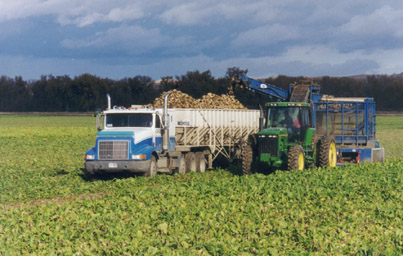|
By Lois Kerr
Beet growers felt they needed a cooperative for several reasons. Growers knew they needed to learn to produce high quality beets in order to entice a processor to the area. Growers also wanted an entity through which they could most profitably market their beets, and they also realized they needed an organization which would speak on behalf of the growers, maintain good relations and good communications with factory management, and ensure that no company could contract different agreements with individual growers. The original charter for the association defined membership rules and the reasons for the formation of the non-profit cooperative. Anyone engaged in beet growing, whether a landowner renting his land, a grower, or tenants of the land, were eligible for membership. Beet growers formed the association to better market beets, and to have the association act as agents on behalf of the individual membership. "In other words," says Don Steinbeisser, current president of the association, now called the Montana Dakota Beet Growers Association, "the association gained the legal right to do whatever was necessary to legally run a cooperative and achieve its objectives, of which the main one was to market beets. The cooperation ensured that interests of all individual members were treated fairly." The original 11 board members came from Savage, Crane, Sidney Fairview, Burns and Williston. Over the course of the 75 years of Holly Sugar/beet grower relationships, some things have not changed. Holly Sugar has always negotiated contracts through the association. Growers have also always signed a market agreement that binds them to the association. "It took 75 years to evolve to where we are today," Steinbeisser remarks. "Things change according to the times, we've all made adjustments along the way, and all the learning from previous years goes into each new contract. We all want the best deal possible." The beet growers used to negotiate a yearly contract with Holly Sugar. This proved to be cumbersome and time consuming, as well as unfeasible for long range farm and financial planning. Holly and the beet growers decided to negotiate five-year contracts, to coincide with the passage of the congressional farm bills. However, the last farm bill Congress passed remains in effect for seven years, not five. Holly and the growers therefore decided on two contracts in that seven-year period, one for three years, and one for four years. "We like to have contracts that stay in effect as long as the current farm bill, as farm bills can change what you do in a contract," Steinbeisser explains. The only thing that changes in a multi-year contract is the number of grower acres allotted each year. "Holly controls the acres," Steinbeisser says. "Holly will negotiate with individual growers for the number of acres each year, and both parties sign an individual grower contract stating those numbers of acres. However, the remainder of the multi-year contract does not change." This multi-year contract includes nearly everything else that has to do with marketing beets. Holly bases the price for beets at harvest on current market prices, with grower payments divided into three payments spread through the year. Growers own 60% of the sugar until it is sold, but they have no input on the factory processing nor on customer sales. The association has involvement on storage and packaging. For each 100 pounds of bulk sugar produced, the association stands 60% of all costs from then on. This includes 60% of the packaging costs, the paper, the plastic wrap used to wrap pallets of packaged sugar, insurance, marketing, taxes. "Growers pay 60% and Holly pays 40% of everything that happens to each 100 pounds of bulk sugar produced," Steinbeisser says. "All this comes about as a result of negotiating contracts with Holly every five years." The growers association will continue to negotiate contracts with Holly Sugar. In today's world, the association also finds it necessary to involve itself in legislation and in lobbying efforts to retain U.S. sugar policies. "We need to keep these sugar policies in place in order to ensure an economic return for beet growers," states Steinbeisser. There are 11,000 beet growers in 14 states, plus four cane growing states. "This is a large force with political clout," Steinbeisser points out. "We need to involve ourselves with the politics of our national sugar policy and work with negotiators on world trade agreements. This is the only way to keep the sugar industry healthy. A change in the current U.S. sugar policy will spell disaster for us." Large sugar users, such as Nestles and Hersheys, in an attempt to increase corporate profits even more, want the U.S. to abandon its current sugar policy by opening the U.S. markets for world sugar imports. If this happens, cheap sugar imports would put American growers and sugar companies out of business. Beet associations, including the Montana Dakota Beet Growers Association, have joined the political arena on behalf of beet growers to fight for a retention of the U.S. sugar policy. "If the whole world got rid of subsidies, we could compete with any grower in the world," Steinbeisser remarks. "However, we can't compete against foreign governments, and until the subsidies are gone, we need to keep our current sugar policy in place to safeguard the American growers." He adds, "We will continue our on-going meetings in Washington D.C. and world wide to maintain sugar policy." Sugar prices today are at a 15-year low. Fluctuations in sugar prices are nothing new. However, as Steinbeisser points out, today's margins are very slim, and costs continue to rise. "Years ago, if commodities went down, input costs went down or at least stabilized," Steinbeisser says. "That's not true today. Prices have fallen, while inputs have increased tremendously. Fuel costs, chemicals, fertilizers, and freight rates are all skyrocketing." He concludes, "Agriculture, including sugar, is going through bad times right now. We need to be optimistic because better days will come. I don't know when, but they will come." The Montana |
 Throughout Holly Sugar's 75 year presence in
the Sidney area, factory management has always worked closely with the
Beet Growers Association. In fact, the organization by the area beet
growers into an association precedes the opening of the Sidney factory by
a year and a half. In January of 1924, a year before construction began on
the sugar refinery, area beet growers elected an eleven member Board of
Directors who formally created a non-profit entity cooperative.
Throughout Holly Sugar's 75 year presence in
the Sidney area, factory management has always worked closely with the
Beet Growers Association. In fact, the organization by the area beet
growers into an association precedes the opening of the Sidney factory by
a year and a half. In January of 1924, a year before construction began on
the sugar refinery, area beet growers elected an eleven member Board of
Directors who formally created a non-profit entity cooperative. Dakota Beet Growers Association today has a
16-member Board of Directors and approximately 235 members. Steinbeisser
has served as president of the association since 1980. Members come from
as far south as Miles City and extend as far north as the Buford-Trenton
district.
Dakota Beet Growers Association today has a
16-member Board of Directors and approximately 235 members. Steinbeisser
has served as president of the association since 1980. Members come from
as far south as Miles City and extend as far north as the Buford-Trenton
district.